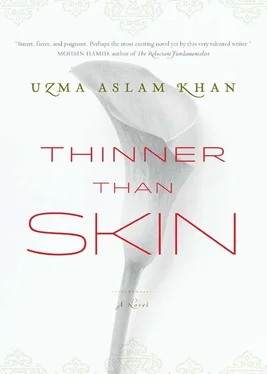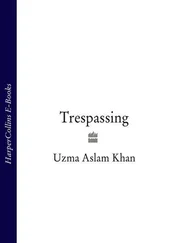It was all very well for Ghafoor to boast that the nomads among whom he now lived were stronger than those among whom he was born, but what were they supposed to do? We have no fight in us . She hoped that whatever fight was left in him, he would apply to the only fight left worth waging.
Such were her thoughts when she noticed Laila, daughter of a nearby dera, trailing her goats a little too close to Maryam’s. But the two knew each other well. They greeted each other by exchanging insults for the sedentary villagers. “Their bottoms stick to cushions like snails to a leaf,” said Maryam, to which Laila added sounds with her tongue that were downright lewd.
Eventually, Laila asked, in a whisper, if Maryam had visited her shrine that day. Keenly aware that the others did not approve of her devotions — even though they had dwindled this year — Maryam began to move away. Laila followed her. “They are here,” she warned, both their herds now feeding on the same shrub. “The men from Balakot.”
Maryam felt the panic rise in her. “What do they want?”
Laila shrugged. “What do they ever want? The glory of Islam!” She giggled. “And no idols! And no shrines!”
Not now , Maryam thought. She mopped the sweat at her lip with her bandage, and winced. It was only a matter of time before they would find it, her little den in the center of a hill, large enough for a fox but not for men with a grudge. Or so she hoped.
They left their goats and tiptoed to a screen of kakwa ferns, from behind which they could see their row of huts. The forked fronds tickled her nose. Pagan seasons for a pagan wife . She was familiar with the taunt, but familiarity never thickened anyone’s skin. Among those who said it were men who called themselves hajis, dangling the boast not only in her face, but in the face of every Gujjar in the area. Not many herders had performed the pilgrimage to Mecca. Of course they wanted to — who did not want forgiveness for her sins? — but how would they get the money? The hajis in the valley wore their skullcaps as though they were horns.
And she could see those fake horns now, from behind the ferns. They were the ones from Balakot. They were the worst. And the most recent. It was not till last year that they started showing up here, which was why her husband forbade her from celebrating Diwali. These men from Balakot knew how the nomads suffered because of the grazing fees and cutting fees and annual permits and taxes and fines and the pressure to be still. Like her mother, they knew the history. Though she was too far away to hear them, she could see them circling two young boys of another tol. The boys were no more than thirteen or fourteen years old. She could guess that the hajis, who did not look much older themselves, would begin their sermon by recalling the policies of the British. That is what the younger hajis with the little horns called them. Not Angrez like everyone else. So smart in their black vests.
The two women were now behind a row of tall bhekkar shrubs, the trunks barely wider than them. “The British colonized your lands and instituted a forest policy for their greedy pockets!” She could hear them clearly now, speaking Hindko in a strange accent. They knew it had never been their land, and never would be. “And before them, that Sikh dog Ranjit Singh and his followers, they also crushed the glory of Islam!” She could now see two older men, with turbans wound differently from Gujjar men. “Until the birth of the great martyr Syed Ahmad Barelvi, who devoted his life to jihad!”
Then issued a long account of the Battle of Balakot, where Barelvi was martyred. She had heard it before. She knew what was next. The martyr was buried in Balakot, making it sacred ground (yet they condemned idolatory!) and an inspiration for their cause. The British had gone, but there was another infidel stalking their land, for whom the government of Pakistan fought repeatedly, first against the infidel Russians in Afghanistan and now against our own Afghan brothers. Would they not join the cause, these brave Gujjar men, whom neither the British nor the Sikhs nor the forest nor the mountains nor the rivers had ever been able to tame?
She could see one boy nodding, while the other scratched the dirt with his broken rubber slippers. His feet were caked in dirt. The two young hajis wore Peshawari chappals, gold embroidered on beige and brown leather. On the center strap of each slipper was a large red pom-pom. The older men wore chappals of scuffed black leather. One of them now began cajoling the boy scratching the dirt. He ruffled his hair. He pinched his cheek. “What do you say?” He made kissing sounds. The boy, still looking down, mumbled something that made the men laugh. The other boy played with a gold chain around his neck. It looked expensive, that chain. He was still playing with it with one hand when he grabbed the bashful boy’s hand with the other and welcomed everyone into a hut. Within seconds, the red pom-poms were leading the way.
Like the forest inspector and tax collector who had always plagued them, and like the policemen, soldiers, and spies who plagued them now, these wrongly turbaned men could also be placated with ghee and sugar, mutton and bread. The more they preached, the hungrier they grew. She did not know what would happen once their supplies ran out.
From what she could hear the men say tonight, outside in the baithak, whose walls did not reach high enough to touch the roof, allowing her to listen freely — for though she must work with men in the forest she must not gossip with them in the hut — this year the patience of the men from Balakot was also running out.
Unlike the preachers of last year, the men said, this lot was not going to stop at words. They were younger and had training camps. They were armed. They had already used their guns against villagers to the south and west. They wanted to recruit; their sons were not safe. They were waging a Sunni jihad against non-Muslims and all allies of the infidel, including anyone linked to the government. This meant the men in convoys, as well as the tax inspector and forest inspector. They were not interested in the forest, unless it was to use it as a camp, should they need to move from Balakot. They had told the Gujjar men that they understood nomadic living.
Maryam pulled away in indignation. Herders did not pray regularly at the mosque, since their migration took them too far. The men from Balakot had at one time chided them for this. Now they called themselves nomadic? She stilled her breast, then glued her ear to the wall again.
One man — it was the voice of a man who had bid for her hand before Suleiman’s family had won — said it was a shame how these men, like their inspiration Syed Ahmad Barelvi two hundred years ago, targeted Muslims. “They say Americans are killing Muslims in Afghanistan and Pakistan, Palestine, and Iraq. Then why kill us?”
“They have not killed us. Yet.” Maryam felt this to be the voice of Laila’s father. It was like distinguishing between bells again.
There was a long pause.
“Who do we cooperate with? The government or the militants?”
“Both.”
“Then they will both be watching us. And they will both strike at us.”
There was another long pause.
“It is true,” a voice broke the silence at last. “We will neither get dry in the sun, nor wet in the rain.”
There were murmurs of agreement, followed by a different proverb offering the same disturbing truth: they were caught between two sides that rejected them equally.
“Do the convoys even care about Fareebi any more?” This voice was high-pitched and clearly peeved. “That shapeshifter?”
“Did they ever? Who was he anyway?”
“Is,” said a young boy, his voice just beginning to crack. “I saw him just today.”
Читать дальше












